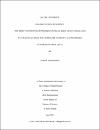The effect of protein supplementation on body muscle mass and fat mass in Qataris post-bariatric surgery: a randomized controlled trial (RCT)
Abstract
Background and objectives: Obesity is a chronic medical condition characterized by an accumulation of excess fat in the body that may lead to negative health consequences. Losing weight may be achieved via dietary and lifestyle modification; however, surgical options are also available with applicable criteria. Bariatric surgery (BS) has been shown to be the most effective type of interventions to achieve and sustain significant weight loss in morbidly obese people. One of the most common post-bariatric surgery complications of is protein malnutrition and micronutrients deficiency. The objective of the present study is to examine the effectiveness of protein supplementation in reducing the risk of developing protein malnutrition that lead to low muscle mass and low protein level, in post-bariatric surgery patients.
Methodology: This study is a double-blinded randomized control trial both investigators and participants were blinded to the treatment. Recruitment of participants began in March 2017 following the ethical approval of the trial (HMC IRB approval no. 16433/16). The intervention group will receive protein supplement which contain 20 g of protein and the placebo group will receive zero protein supplement every day and all participants were followed for 1 month post-surgery. The randomization was done on a weekly basis within blocks of 8 or 10 patients. Independent Sample-T Test and Paired Sample-T Test were performed to measure the effect of the intervention and the control on the study group.
Results: The mean weight loss in the control group was 9.6 kg, while the intervention group mean weight loss was 10.7 kg, with the difference between the 2 groups being statistically significant (p= 0.03). Change in muscle mass percentage was +0.50% in the placebo group, and +2.3% in the intervention group, with a P value of the difference of 0.149. Fat percentage change in the placebo group was -1.6% and -2.6% in the intervention group, with a p value of a difference of 0.153. The percentage change in Albumin in the placebo group was 2.76% and 9.71% in the intervention group, with a p value of a difference of 0.031.
Conclusion: Our study has confirmed findings from multiple studies that protein supplementation in patients post-bariatric surgery is a successful intervention for healthy and balanced weight loss. We have also found after 1 month of follow up that patients who took the treatment displayed higher level of serum albumin than those who took dietary advice alone. We have also shown trends towards significance in results of muscle and fat % change between the 2 groups and a larger sample size and a longer follow-up may further signify these results. This confirms that surgery alone cannot put an end to obesity and must be combined with well-structured nutritional education so patients do not go back to their old habits and put the weight back on.
DOI/handle
http://hdl.handle.net/10576/5780Collections
- Public Health [54 items ]


